Book contents
- Cambridge Handbook of Psychology, Health and Medicine
- Cambridge Handbook of Psychology, Health and Medicine
- Copyright page
- Contents
- Contributors
- Preface
- Part I Psychology Health and Illness
- Section 1 Psychological Aspects of Health and Illness
- Section 2 Psychological Assessment
- 39 Brain Imaging and Function
- 40 Diagnostic Interviews for Assessment of Mental Disorders in Clinical Practice
- 41 Disability Assessment
- 42 Health and Illness Cognitions
- 43 Health Status and Quality of Life Assessment
- 44 IQ Testing
- 45 Mood Assessment
- 46 Neuropsychological Assessment
- 47 Pain Assessment
- 48 Patient Outcomes Monitoring
- 49 Psychoneuroimmunology Assessment
- 50 Social Support Assessment
- 51 Stress and Coping Assessment
- Section 3 Psychological Interventions
- Section 4 Health Care Practice
- Part II Medical Topics
- Index
- References
44 - IQ Testing
from Section 2 - Psychological Assessment
Published online by Cambridge University Press: 05 June 2019
- Cambridge Handbook of Psychology, Health and Medicine
- Cambridge Handbook of Psychology, Health and Medicine
- Copyright page
- Contents
- Contributors
- Preface
- Part I Psychology Health and Illness
- Section 1 Psychological Aspects of Health and Illness
- Section 2 Psychological Assessment
- 39 Brain Imaging and Function
- 40 Diagnostic Interviews for Assessment of Mental Disorders in Clinical Practice
- 41 Disability Assessment
- 42 Health and Illness Cognitions
- 43 Health Status and Quality of Life Assessment
- 44 IQ Testing
- 45 Mood Assessment
- 46 Neuropsychological Assessment
- 47 Pain Assessment
- 48 Patient Outcomes Monitoring
- 49 Psychoneuroimmunology Assessment
- 50 Social Support Assessment
- 51 Stress and Coping Assessment
- Section 3 Psychological Interventions
- Section 4 Health Care Practice
- Part II Medical Topics
- Index
- References
Summary

- Type
- Chapter
- Information
- Cambridge Handbook of Psychology, Health and Medicine , pp. 196 - 199Publisher: Cambridge University PressPrint publication year: 2019



